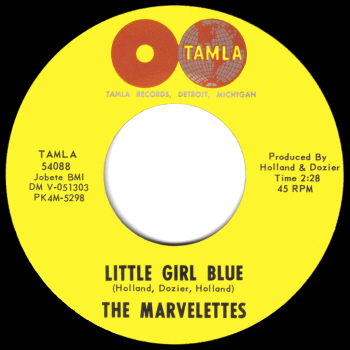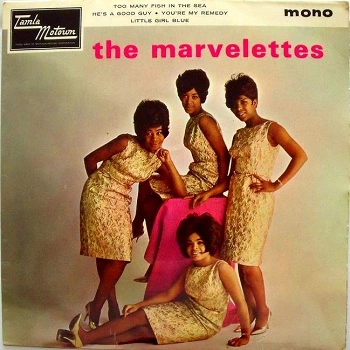Tags
 Tamla T 54088 (B), October 1963
Tamla T 54088 (B), October 1963
B-side of As Long As I Know He’s Mine
(Written by Brian Holland, Lamont Dozier and Edward Holland Jr.)
 Stateside SS 251 (B), January 1964
Stateside SS 251 (B), January 1964
B-side of As Long As I Know He’s Mine
(Released in the UK under license through EMI / Stateside Records)
 Of course, a lot of the problems I have with the A-side As Long As I Know He’s Mine are thrown into sharp relief by its close proximity to this, which is a huge improvement. For starters, it actually sounds like a record from 1963 by one of Motown’s top groups, rather than somebody’s half-finished demo reel; no, this is definitely the real deal.
Of course, a lot of the problems I have with the A-side As Long As I Know He’s Mine are thrown into sharp relief by its close proximity to this, which is a huge improvement. For starters, it actually sounds like a record from 1963 by one of Motown’s top groups, rather than somebody’s half-finished demo reel; no, this is definitely the real deal.
The Marvelettes’ previous dalliances with the Holland-Dozier-Holland songwriting trio hadn’t produced anything genuinely golden so far (the so-so Locking Up My Heart the best of a thin crop); certainly nothing to match the sterling work Brian Holland and Lamont Dozier had carried out with Freddie Gorman for the girls back in 1962. But this is a whole different kettle of fish; it’s excellent.
Opening with a bright, layered guitar intro (which settles into a twanging riff that runs throughout the song) and featuring some of the best horns yet heard on a Motown record, as well as echoing drums and piano augmenting the whole mix, this B-side is a great example of the creative decisions now being taken by Hitsville producers. To preserve the vitality and “fresh air” feeling of the excellent music, the vocals on this one – both lead and backing – appear to have been transposed upwards by a semitone or two from the singers’ usual range, leaving everyone singing at a higher pitch than normal and leading to a strange atmosphere that isn’t really present on any other Marvelettes record.
(Gladys Horton, who takes the lead here, sounds almost nothing like her usual self; many observers – including me to begin with! – have assumed it was Wanda Young doing the lead on this, as Wanda was usually tasked with any high lead parts for the Marvelettes during the period. But no: every source I can find says it’s Gladys, way outside her comfort zone.)
It’s a clever move which has unintended benefits; the group are still shrill and wayward in places, but the higher pitched arrangement means they’re also softer, less abrasive.
 Ironically for a group whose backing vocal performances are more scrutinised than any other Motown act, the Marvelettes were always game for experimentation on the part of songwriters and producers when it came to vocal lines. Their début mega-hit Please Mr Postman had made excellent use of swapping the lead and backing lines back and forth, dovetailing throughout to keep the rhythm going; other Marvelettes tracks have the backing vocals either leading off the song or taking over the main vocal line, and this is the most ambitious flowering of that creativity. Married quite expertly to the lyrics, so that the form and function reflect one another, it’s clear some long, hard thought went into putting this together on HDH’s part.
Ironically for a group whose backing vocal performances are more scrutinised than any other Motown act, the Marvelettes were always game for experimentation on the part of songwriters and producers when it came to vocal lines. Their début mega-hit Please Mr Postman had made excellent use of swapping the lead and backing lines back and forth, dovetailing throughout to keep the rhythm going; other Marvelettes tracks have the backing vocals either leading off the song or taking over the main vocal line, and this is the most ambitious flowering of that creativity. Married quite expertly to the lyrics, so that the form and function reflect one another, it’s clear some long, hard thought went into putting this together on HDH’s part.
The backing vocal trick play is among Motown’s best little touches; in a genuinely clever device, the backing vocals take the entire first two verses of the song, with only short interjections from Gladys, before she then seamlessly takes over and starts putting her side of the story, a change in both lead vocalist and lyrical perspective. It works so well that you don’t even notice it’s happened to start with, but it’s fantastic. Let me explain.
It’s a song about loyalty and faithfulness, the same sort of theme that was explored on the A-side As Long As I Know He’s Mine and which would later be examined in Mary Wells’ My Guy, but the approach here is something quite different. The song is a dialogue between Gladys’ narrator and the other Marvelettes, her friends, who exhort her to see she’s having the wool pulled over her eyes; Gladys is spending her evenings sitting at home waiting for a phonecall from her suspiciously quiet boyfriend, and the friends are both certain they know why he’s not called, and indulging in a spot of “I told you so” self-righteousness at Gladys’ expense. Her boyfriend is a cad who is stringing her along while chasing other options, the girls inform everyone, and they spend those first two verses pleading with Gladys to wake up and smell the coffee, realise she’s being played for a fool. But when we actually meet Gladys, she won’t hear a word of it, standing up for her man in the face of her friends’ criticism, refusing to listen to their gossip and instead looking forward to their triumphal reunion (described with heartbreaking teenage anticipation just as the music swells with a heart-bursting flourish).
This is where the clever structure really earns its corn; Gladys’ high, vulnerable voice on this one lacks the boisterous, bolshy confidence featured on her earlier Marvelettes leads (and used for dramatic purposes on Too Strong To Be Strung Along, where she played a part almost the polar opposite of her character here), and again it suits the song and the role perfectly. Her loyalty feels misguided (both due to the structure, which gives us the criticism of the boyfriend before the defence, four voices against one, and the very title of the song – compare and contrast the upcoming He’s A Good Guy (Yes He Is), which is another riff on the same general theme), but she’s also defiant – her determination to stay in and wait for his call “here at home, all alone, sitting by the telephone” can be read as either self-pity, or a declaration of self-reliance (if you won’t wait up with me, fine, suit yourselves). As if influenced by this, the backing vocals (as they now are) mollify their approach, going from accusatory to wearily resigned; they’re not being bitchy any more, they just feel sorry for her. The song fades out with both sides stating their case, both sure they’re right and that the others are being inescapably foolish, and the ending is smartly left up in the air; is she right? Will he call? We don’t know, and we don’t need to, because this isn’t about what actually happens, it’s about two contrasting sets of perceptions and a heady stew of teenage emotions.
It’s a great song and a great record, intricate and beautiful in its construction, almost heartbreaking in its impact, the best Marvelettes record in at least a year. It’s not really a single, but then neither are Someday, Someway or Forever (or Strange I Know, come to that), and they’re all wonderful; anyway, almost 50 years later, it doesn’t matter any more, it’s what’s in the grooves that counts. If the Marvelettes’ sales figures weren’t getting better, this is ample proof that on their day the group still deserved to be counted among Motown’s best. Remarkable.
MOTOWN JUNKIES VERDICT
(I’ve had MY say, now it’s your turn. Agree? Disagree? Leave a comment, or click the thumbs at the bottom there. Dissent is encouraged!)
You’re reading Motown Junkies, an attempt to review every Motown A- and B-side ever released. Click on the “previous” and “next” buttons below to go back and forth through the catalogue, or visit the Master Index for a full list of reviews so far.
(Or maybe you’re only interested in The Marvelettes? Click for more.)
 |
 |
| The Marvelettes “As Long As I Know He’s Mine” |
Eddie Holland “I’m On The Outside Looking In” |
DISCOVERING MOTOWN |
|---|
Like the blog? Listen to our radio show! |
| Motown Junkies presents the finest Motown cuts, big hits and hard to find classics. Listen to all past episodes here. |


🙂 Agree with every word here. This was, by far, the more interesting side of the record, and it took me until 1976 to land an original Tamla 54088 single.
A 9 it is, and it was a 9 that would soon go lost, as it was never included on any Marvelettes LP, and once Motown’s “YesterYear” label was inaugurated in 1972, with one old A-side matched with another, “Little Girl Blue” (like “Tie A String Around Your Finger”) was technically out of print and you had to hunt remainder originals.
Who even knows -maybe Katherine Schaffner could say- just how many Holland-Dozier-Holland/Marvelettes sessions there were in these last months of 1963. Under the guise of the name “The Darnells”, in November, we know the “Too Hurt To Cry, Too Much In Love To Say Goodbye” teaming was with HDH too. And the summit was surely on December 30, when “Knock On My Door” was recorded. Wouldn’t we all love to know whatever nuggets remain to be discovered?
LikeLike
The title of the single, as shown on the 45 above, is “Little Girl Blue.” Why is it now referred to as “He Won’t Be True (Little Girl Blue)? Just curious.
Another great review, by the way. Thanks!
LikeLike
Just one of those weird quirks; it’s not clear when it acquired the extra four words and the new punctuation, but they’re on both TCMS 3 and the Forever box set, so I’ve followed that editorial decision here.
LikeLike
Just as “Heatwave” became “Love Is Like A Heatwave” to distinguish it from the Marilyn Monroe song, “Little Girl Blue” was probably changed to “He Won’t Be True” as there was already a Rodgers & Hart composition of that name.
LikeLike
I’ve seen three versions of this song title: the original – “Little Girl Blue” as per the U.S. and U.K. 45s, “He Won’t Be True” (by itself), and the longer one, as headlined in the review above. Regardless of any so-called “correctness” or even publishing considerations, I personally prefer the one shown on the single, rather than either of the “revisionist” versions, which I’m sure will somehow get “selectively” applied, just like the “Heat Wave” / “Love Is Like A Heatwave” / “(Love Is Like A) Heat Wave” nonsense that we’ve all seen over the years. Can’t wait for “Always In My Heart” and its variants to crop up (…yawn!!) but that’s for 1964.
LikeLike
In this instance, I much prefer the long title. (I needed it for the review, for one thing.) It’s a pretty subjective area, though (see also: Dream Come True, Shake Sherry, anything with “Goodbye” in the title), and it’s usually an irrelevance, so I normally go with my gut feeling, which on this occasion was very much in favour of the long version.
(I also prefer “Reach Out (I’ll Be There)” rather than the unpunctuated version, just to throw that in there).
LikeLike
Aha… “revisionist” sympathies are clearly showing here then, Mister Nixon 🙂 …but you’re right, in as much as personal preference, by definition, is a completely subjective area.
LikeLike
I love Gladys’ falsetto on this. Love the arrangement and lyrics. I think this could have been an A-side. 8/10
LikeLike
Yeah a song that “earns it’s corn” get my vote (i LOVE that phrase. I gotta use it). A solid 9 fodr sure.
LikeLike
Great song. I’d give it an “8”.
LikeLike
What I like about this one is how simply it begins in a manner that any average girl group could duplicate. (My reaction when I purchased and played it the first time back in ’63 was, “What is this? Another throwaway B-side.?”) Ahh, but then the record kept spinning, and then came the musical nuances, and the clever exchanges between lead and chorus, and the tremendous ending segment with rhe harmony kicking in. Talk about a song growing on you. This record grew on me in the space of 2 minutes and 28 seconds and clearly showed itself to be not simple one at all but one that would not only separate an average from a good group but a good from a great group. The Marvelettes pulled it off as only they could and fully earned every one of its 9 points.
LikeLike
Yep, this is HDH’s best song of 1963, even considering Heatwave. Great to hear it again
LikeLike